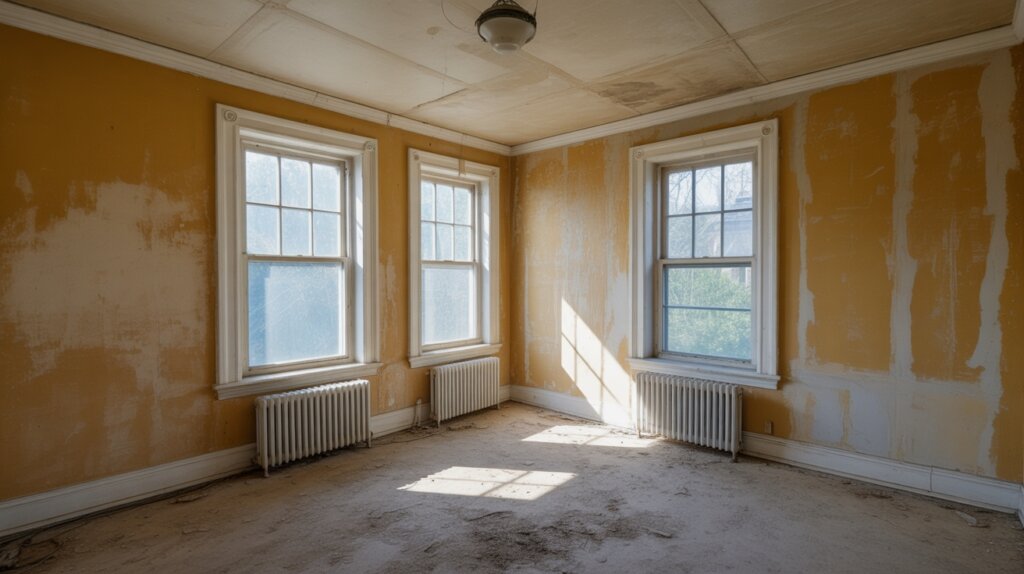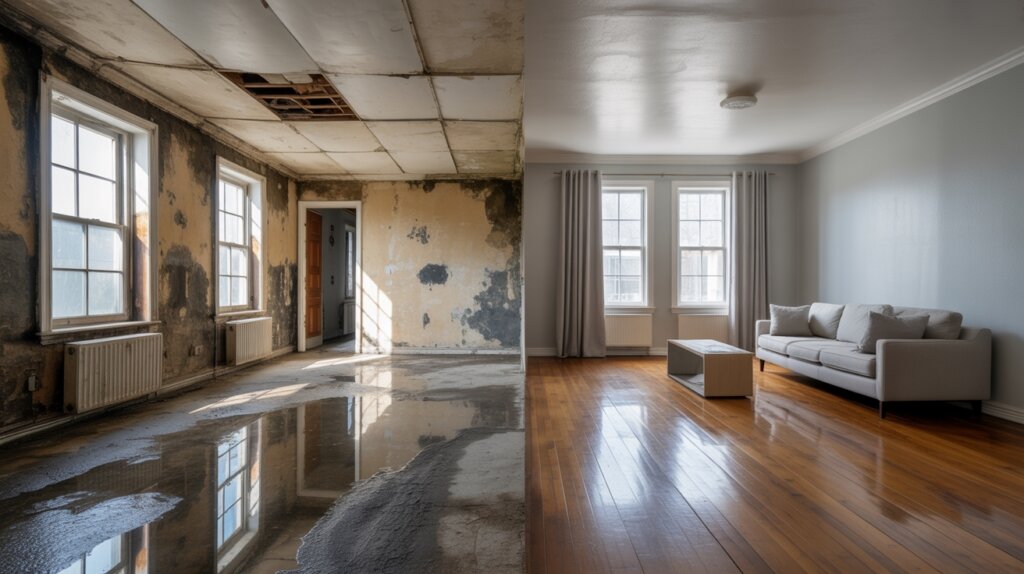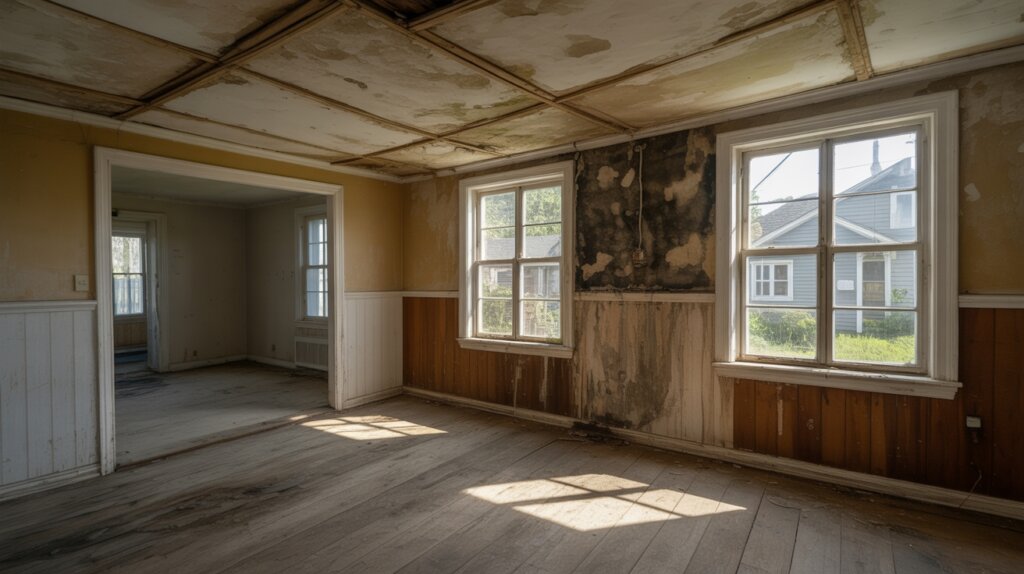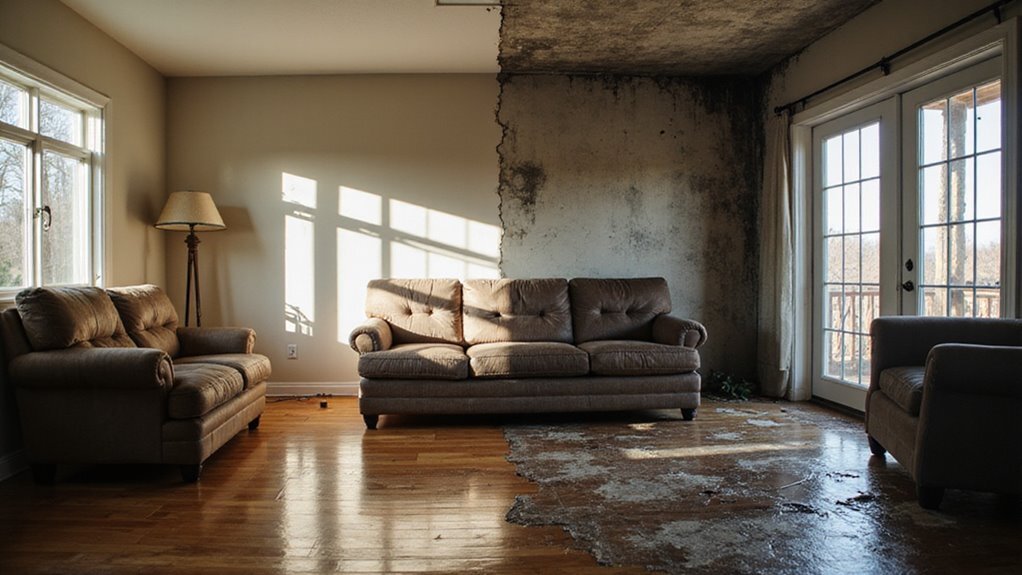Selling a house with mold or water damage is much harder than selling a typical home. These issues scare away many buyers and raise concerns about health and repair costs. Most homeowners do not expect how much these problems can affect their sale.
The process often takes much longer, and offers are usually much lower. Buyers worry about hidden issues and expensive repairs. Lenders may not even approve loans for these homes, making the process even harder. Homes with mold or water damage sell slower and for less money than traditional sales.
You can still find ways to improve your outcome, even with these issues. Knowing what to expect helps you plan and negotiate better. This blog will guide you through selling a home with mold or water damage and show you how to avoid common mistakes.
Key Takeaways
- Homes with mold or water damage sell for 10–30% less and typically spend 20–50% longer on the market than traditional sales.
- Buyers are more hesitant, often demanding inspections, repair credits, or price reductions due to health and repair concerns.
- Sellers face legal obligations to disclose all known damage, with failure risking lawsuits, canceled sales, or lower offers.
- Damage often complicates negotiations, slows the process, and can affect mortgage approvals and insurance coverage.
- Selling as-is to investors or cash buyers can speed up the sale but usually results in significantly lower offers.
Understanding Mold and Water Damage in Homes

Mold and water damage are problems that can lower a home’s value and weaken its structure. Mold grows quickly in wet places, often after leaks or floods. If you do not fix moisture problems, mold can appear within two days.
Water damage is more than just wet surfaces. Restoration must include checking for hidden moisture and drying all affected areas. If this is not done, the home may suffer long-term damage.
Ignoring these issues can make your air unhealthy and scare away buyers. If you address problems early, you can help keep your property’s value. Knowing these facts helps you protect your home.
Common Causes and Signs of Mold or Water Damage
Many homes have mold or water damage because of leaks and poor ventilation. Common causes include roof leaks, plumbing issues, and cracks in the foundation. If a house has minor leaks or poor drainage, mold can start to grow. A thorough property lien search can help identify underlying issues that may contribute to water damage, such as unresolved liens or legal encumbrances affecting property maintenance.
Staying informed about market variables is essential because economic trends and lifestyle changes can influence the urgency and options for selling a damaged property. Signs of water damage include water stains, musty smells, and warped floors. Visible mold spots are also a warning sign. These problems can lower the value of your home. Homes with old materials or bad drainage are more likely to have these issues. Regular maintenance, like cleaning gutters and sealing windows, can help prevent damage. If you find these signs early, you can avoid expensive repairs later.
Impact on Property Value and Marketability

Mold or water damage can lower your property’s value and make it harder to sell. Homes with these issues often lose 10% to 30% of their value. Buyers may avoid such properties or make very low offers.
If mold or water damage is visible, the property usually stays on the market longer. Appraisals often reflect the damage, which can limit buyer financing. Home staging and curb appeal do not fully fix these problems.
Ignoring these issues can lead to further deterioration and increased repair costs over time. Addressing them early helps protect your investment and maintain your home’s marketability. Conducting a professional inspection ensures that all issues are identified and properly managed before listing. Understanding the extent of damage can help you make informed decisions about repairs or disclosures.
Buyer Concerns and Perceptions
Buyers often worry about mold or water damage. They see these problems as signs of hidden risks and extra costs. If a home has these issues, buyers may lose interest or offer less money.
Visible mold, water stains, or musty smells raise health and safety concerns. These signs may mean roof leaks, plumbing problems, or high humidity. Buyers might also think there are costly repairs or future maintenance needs. Addressing property condition concerns proactively can help reduce buyer hesitation.
If buyers believe a property has hidden damage, they may be hesitant to buy. They could worry about insurance troubles or expensive remediation. Title insurance can help mitigate some of these fears by protecting against undisclosed issues and legal disputes. Sellers need to address these fears to keep strong offers and sell quickly.
The Role of Home Inspections

When you schedule a home inspection, certified inspectors use specialized tools to uncover hidden mold and water damage that buyers can’t spot during a walkthrough. Industry data shows that 86% of buyers request inspections, and any issues flagged often lead to renegotiations or price reductions.
Understanding this process is critical, as inspection findings directly influence your sale timeline and final offer. Being aware of the extent of foundation issues can help you better prepare for negotiations and repairs. Moreover, a thorough title search and resolution process ensures that any legal or encumbrance issues are addressed beforehand, minimizing surprises during closing.
Inspection Process Overview
A home inspection is essential when selling a house with mold or water damage. It affects the price and buyer trust. If you skip this step, the sale can fail or face delays.
Inspectors check both visible and hidden areas for moisture and mold. They use special tools like moisture meters and infrared cameras. Their findings show the true extent of the problem.
The inspection report shapes how you present your home to buyers. Buyers use this report to judge risk before making an offer. If the report is negative, repairs or credits may be needed.
Understanding the inspection process helps you meet legal rules and manage buyer expectations. If you stay informed, you can handle negotiations with more confidence.
Identifying Hidden Issues
Mold and water damage often hide in places you cannot see, like behind walls or under floors. A home inspection is necessary to find these hidden problems. If you skip this step, you might miss important issues.
Certified inspectors use special tools to detect moisture and mold. Infrared cameras and moisture meters help find damage that is not visible. Air sampling can show if there is hidden mold in the home.
If hidden issues are found early, you can fix them before buying or selling. This reduces the risk of future problems or disputes. Knowing the true condition of the home helps you make better decisions.
Impact on Sale
A home inspection can directly affect your home sale. Buyers want a clear picture of the home’s condition. If there are problems like mold or water damage, the sale can become more difficult.
The inspector may find hidden issues that you did not know about. If this happens, buyers could ask you to make repairs or lower the price. Some buyers might lose trust in the property and walk away.
If the inspection finds serious problems, lenders might refuse to give buyers a loan. Data shows that inspection concerns cause 14% of sales to fall through. If buyers think the home is too risky, the deal may not close.
Sellers should fix problems before listing the house. This step helps maintain control over the sale process. Proactive repairs can keep buyers confident and protect your sale.
Disclosure Requirements and Legal Obligations
When you sell a house with mold or water damage, you must follow strict disclosure laws. You need to tell buyers about any known mold, water damage, or past flooding. If you hide these problems, you could face legal trouble. Disclose All Known Title Issues to Potential Buyers to avoid concealing problems that could lead to legal complications. Buyers can sue you or ask to cancel the sale.
They might also ask you to pay for repairs. The National Association of Realtors reports that hidden defects often lead to lawsuits or lower selling prices. If you do not disclose issues, you risk lawsuits, financial loss, and a damaged reputation. Full honesty protects you from these risks. Additionally, understanding local market conditions can help you determine the appropriate disclosures and pricing strategies to navigate potential legal and financial pitfalls.
Financing and Mortgage Challenges
Mold or water damage can make it hard for buyers to get a mortgage. Most lenders do not approve loans for homes with unresolved damage. Appraisers will often note these issues, which causes more inspections or loan denials. Understanding market value and accurate appraisals are crucial, as damage can significantly impact the home’s valuation. Lenders usually want all damage fixed before they approve a mortgage.
If you have to do repairs first, your costs may go up. Government loans like FHA or VA will not finance homes with clear mold or water problems. The appraised value of your home may drop if there is damage. This can affect how much buyers need for a down payment. Even if your home looks good, the history of damage may turn buyers away or delay your sale. Recognizing the impact of repair costs and how they influence financing can help you plan and avoid surprises during the selling process.
Insurance Considerations for Damaged Homes
Mold or water damage can make insurance more complicated when selling a home. Most standard home insurance does not cover mold or slow water damage. Only about one in five water damage claims are fully paid by insurers.
Understanding home insurance coverage is crucial to navigate these challenges effectively. Mold or water damage often complicates home insurance, with most policies excluding coverage and few claims being fully paid by insurers.
If you are selling, you must share any past insurance claims with buyers and agents. Previous claims can raise insurance costs or reduce coverage for the next owner. This could make selling your home harder.
You should check your policy for what it does and does not cover. Make sure to keep clear records of all damage and repairs. If you are unsure, talk to your insurance provider before putting your home up for sale. Disclosing known issues is essential to maintain transparency and compliance with disclosure requirements.
Repair and Remediation Options
Understanding your insurance limitations highlights the importance of addressing mold and water damage before listing your property. Proactive repair and remediation not only protect your investment but also streamline the sales process. If you want to position your home competitively, consider these data-backed options:
- Hire certified remediation specialists—They use industry-standard protocols to eliminate mold at the source, minimizing liability.
- Invest in moisture mitigation—Professional dehumidification and waterproofing reduce future risks and increase buyer confidence.
- Prioritize cosmetic restoration—Fresh paint, repaired drywall, and updated flooring enhance home staging, making your property market-ready.
- Obtain post-remediation clearance—Third-party verification assures buyers and can positively impact closing costs.
Costs Involved in Addressing Mold or Water Damage
Addressing mold or water damage before selling your home can cost between $500 and $6,000 or more. The exact cost depends on the size and severity of the problem. Minor repairs are less expensive, while severe cases cost much more.
Home staging may be necessary after repairs to improve the home’s appearance. This service can add several hundred to thousands of dollars to your expenses. If you skip staging, your home may not attract as many buyers.
Ignoring water or mold issues can hurt your sale price. Visible problems often lower the value of your home and nearby properties. Buyers may offer less or avoid your listing completely.
Professional inspections, material replacement, and labor are usually required. These steps ensure your home meets market standards. A thorough building exterior inspection helps identify potential issues early, saving you money in the long run. If you want to sell quickly and at a good price, these costs are important to consider.
Selling As-Is to Investors or Cash Buyers
Selling as-is to investors or cash buyers means you sell your house without making repairs. Homeowners often choose this if the house has mold or water damage. This method skips the usual steps of fixing up the property.
Investors look at the property’s value after repairs and compare it to others nearby. If you want a quick sale, this option can help. It also avoids the stress of traditional home sales.
As-is sales often close 30% faster than standard listings. There is less risk of the deal failing over inspection problems. You do not need to worry about staging or curb appeal.
Marketing Strategies for Damaged Properties
To market a property with mold or water damage, focus on clear and honest communication. Share all known issues in your listings. This builds trust with potential buyers.
Use online platforms like MLS and social media to reach investors and buyers looking for fixer-uppers. Professional photos should show the home’s best features. If possible, stage the space to help buyers see its potential.
Industry studies show that staged homes sell much faster. Honest marketing with good visuals attracts serious offers. If you combine these steps, you will reach more qualified buyers.
Negotiation Tactics and Offer Expectations
Properties with mold or water damage usually get offers below market value. Buyers often ask for repair credits or price cuts. You should expect these tactics when selling distressed homes. Homes with mold or water damage often receive low offers, as buyers seek discounts or repair credits for these issues.
A strong pricing strategy can help you get closer to your goal price. If you price competitively using recent sales data, you can attract more serious buyers. Always be ready for buyers to push back due to the risks involved.
If you disclose all known defects, you can build trust and avoid legal issues. You should respond to low offers with clear repair estimates. Staying calm and objective will help you make better counteroffers.
Buyers may overstate repair costs to justify lower prices. If this happens, use real numbers to support your position. Remaining unemotional can prevent you from making costly mistakes.
Timeline Differences Compared to Standard Sales
Selling a home with mold or water damage usually takes longer than a standard sale. These properties need extra inspections and repairs, which can delay closing by several weeks. Lenders and appraisers may also require proof that all issues have been fixed.
Marketing these homes is harder because damage can turn away buyers. If damage is visible, photos and showings may not attract much interest. Homes with mold or water problems often stay on the market 20–50% longer than similar homes in good shape.
If you plan to sell a home with these issues, expect a slower and more complicated process. Buyers may ask for reports on repairs and remediation. Sellers should be ready for extra steps and possible delays.
Conclusion
If you need to sell a house with mold or water damage, you should expect a different process than a traditional sale. If you address issues early and provide full disclosure, you can avoid legal problems later. If you choose not to repair the damage, you may face lower offers and a longer time on the market.
If you want to sell quickly, you could consider selling your house as-is for cash. We buy houses for cash, regardless of their condition or any water or mold problems. If you want less hassle, this option can save you time and effort.
If you are ready to sell your damaged house, we can help make the process smooth and straightforward. We at Greg Buys Houses are ready to give you a fair cash offer today. Contact us now to get started!

